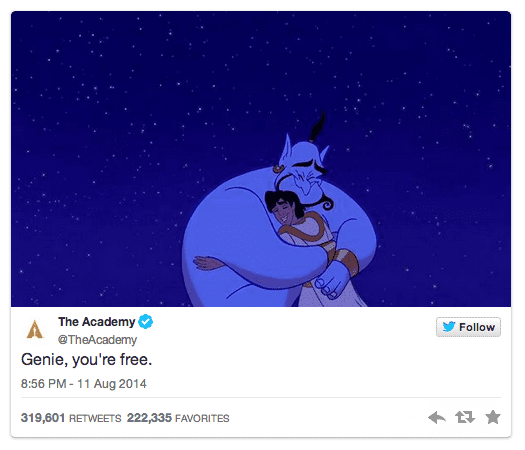On Monday, we lost Robin Williams, and I say “we” because he mattered to all of us. He was—is, and always will be—very widely loved. Regardless of why you loved him, there was something about him that made you feel wonderful, good. Excited to be watching whatever it is you were watching. And understandably so: the man was a gift.
I think that’s why we’re all grieving so openly. Twitter, Facebook, and Instagram are full of tributes to the man who brought us endless childhood laughs and adult tears (hello, me watching Dead Poets’ Society for the first time), while comedians like Chris Gethard and Norm MacDonald shared stories of working with Robin that made those adult tears come right back. It sucks, but we’re all in this loss together.
Which is why dismissing somebody’s choice to grieve a celebrity kills me. Feelings and emotion aren’t embarrassing—cynicism and using somebody’s death as an excuse to talk shit is. Yesterday, among the tributes, video clips, and quotes, I saw a sad few condemn the outpouring of grief for Robin Williams after listing what they didn’t like about him as a comic and person. Since, many of those tweets have been deleted (because of course they were), but . . . what the fuck? What was the point of spitting vitriol about someone’s comedic legacy (or anything else)? Usually, you don’t march into a wake and say, “YEAH YEAH YEAH, but I hated so-and-so- and here’s why,” so why pretend you don’t care online?
Especially since everybody cares. (Some, about people who die. Others, about feeling superior after somebody dies.) Grief means different things to different people, and understanding somebody else’s grief is impossible. That shit is layered. It’s not on you to personally decide what feelings, thoughts, and memories a person has in the wake of a loss (even the loss of a public figure they never knew) are genuine. Calling out people for expressing sadness at a difficult time says far more about the person doing the calling out than about the person engaging in a public display of grief, and as does snark, passive-aggression, and straight-up mockery. Respect the grief. Loss is loss.
The thing about social media is that it allows us to grieve collectively. Talking to friends at work or at dinner about your memories of a famous person or about their work can happen, but only in a limited sense. (Nobody wants to be cornered in the bathroom.) But online? Among like minds who feel the same way? It’s gold. Because grief is also lonely, and sharing in it with people who seem to know exactly the calibre of your grief makes it seem less so.
Through memories, stories, and even firsthand accounts about getting help for mental health disorders, social media makes it feel like we’re all at a celebration of life or like we can make our own feel better, while also being given the necessary space to mourn. Because these celebrities, despite us not knowing them, were still people. People who lived and helped us and struggled and suffered and are now gone. And that sucks. It’s painful, and it’s sad. And acknowledging that is okay. I mean, hello: we’re people, too.
![]()



 Follow Us On Instagram
Follow Us On Instagram
